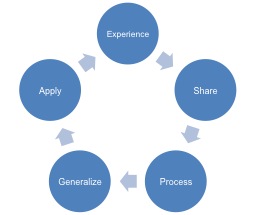Using the Experiential Learning Model
In 4-H we talk a lot about hands-on learning and experiential learning. Experiential learning (PDF) is more than just doing activities. It involves discussing the activity, drawing lessons from the activity, and applying the lessons to the real world. The following is an outline of that process.

Do
Experience – Begin with a concrete experience. This can be an individual activity or group activity, but it involves “doing something.”
Activities can include: demonstrations that involve the youth judging items (e.g., which snack is better for them – not being judged by others), making exhibits for an event, field trips or recreational activities.
Reflect
Share – Next get the group or individual to talk about the experience. Share reactions and observations. Talk freely. Encourage group members to answer questions posed by others. Avoid having the leader answer questions.
Sharing Questions
- What did you do?
- What happened?
- How did you feel?
- How did it feel to..?
- What was the most difficult? Easiest?
Process – Discuss how questions are created by the activity. The leader might list some of the reoccurring themes, issues, or questions.
Processing Questions
- What problems or issues seemed to occur over and over?
- What similar experience have you had?
Apply
Generalize – Find general trends or common lessons in the experience. Identify the important points that apply to the “real world.”
Generating Questions
- What did you learn about yourself through this activity?
- What did you learn about (life skill, i.e.., making decisions)?
- How do the major themes or ideas relate to real life and not just the activity?
- How did you go about making your decision?
Apply – Talk about how the new information can be applied to everyday life or sometime in the future.
Applying Questions
- How can you apply what you learned (making decisions) to a new situation?
- How will the issues raised by this activity be useful in the future?
- How will you act differently in the future as a result of this activity?
